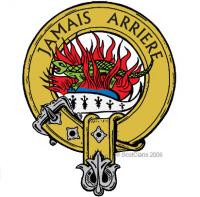
Clan Douglas
Clan Douglas People
James Douglas (c1286-1330)
James Douglas’ father William was executed by the English at the Tower of London in 1298 for his patriotic efforts beside William Wallace. At the time of his death his son had already spent two years in Paris, safe but poor.
In 1306 he rode on a stolen horse to fight beside Robert the Bruce. He was a brilliant military strategist, running a guerrilla campaign through 1307 and 1308, relieving the English of their supplies and reclaiming his own Douglas Castle. He pre-empted an ambush by John Lorne in 1309, then won back the Royal burgh of Roxburgh for Scotland in 1314.
At Bannockburn he was knighted. By 1327 he was known by the English as ’Black Douglas’ after continuing raids across the border. It was Robert the Bruce’s dying wish that his heart be buried in the Holy Lands and it was the Good Sir James who endeavoured to fulfil this in 1330, the year after his death.
He died however whilst fighting the Moors at Teba de Andales in Spain, and is remembered there as ‘El Grand Duglas’.
Thomas Douglas, 5th Earl of Selkirk (1771-1820)
Recognising the inevitability and possibly the scale of the clearances, Selkirk drew up plans to study and easy the difficulties facing emigrants in their new settlements. He led eight hundred emigrants to Prince Edward Island and successful settlements in 1803.
The following year he tried a further project at Baldoon on Lake St Clair, although with difficulties. Without Government support he bought land and established the Red River colony of Winnipeg. Immigrants came to Fort Douglas from Ireland, Sutherland and Orkney, much to the displeasure of the North West Company’s trappers, who attacked the colonists in 1815 and 1816.
Selkirk lost a great deal of money taking the company through the courts and died soon afterwards. The colony however lived on.
 David Douglas (1799-1834)
David Douglas (1799-1834)
Leaving school at aged ten to become a gardener’s apprentice at Scone Palace, Douglas had become under gardener at Glasgow’s Botanic Gardens by 1820. Through William Hooker’s influence, he found himself due to set off for China as part of a plaint-hunting expedition with the Horticultural Society of London. The trip was cancelled and Douglas instead found himself in 1821 on the first of a number of trips across North America.
It was during his third expedition he gave his name to the Douglas fir. In 1834 during a stopover at Hawaii’s Sandwich Islands he fell into a cattle trap in the forest floor already occupied by a trapped bull and was gored and stamped to death.









